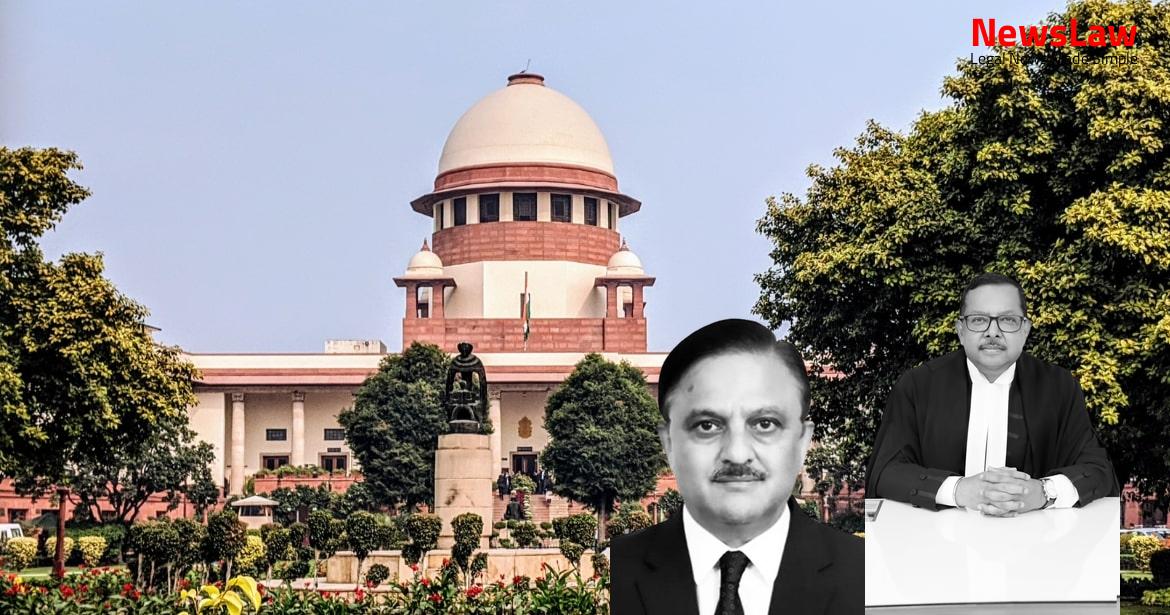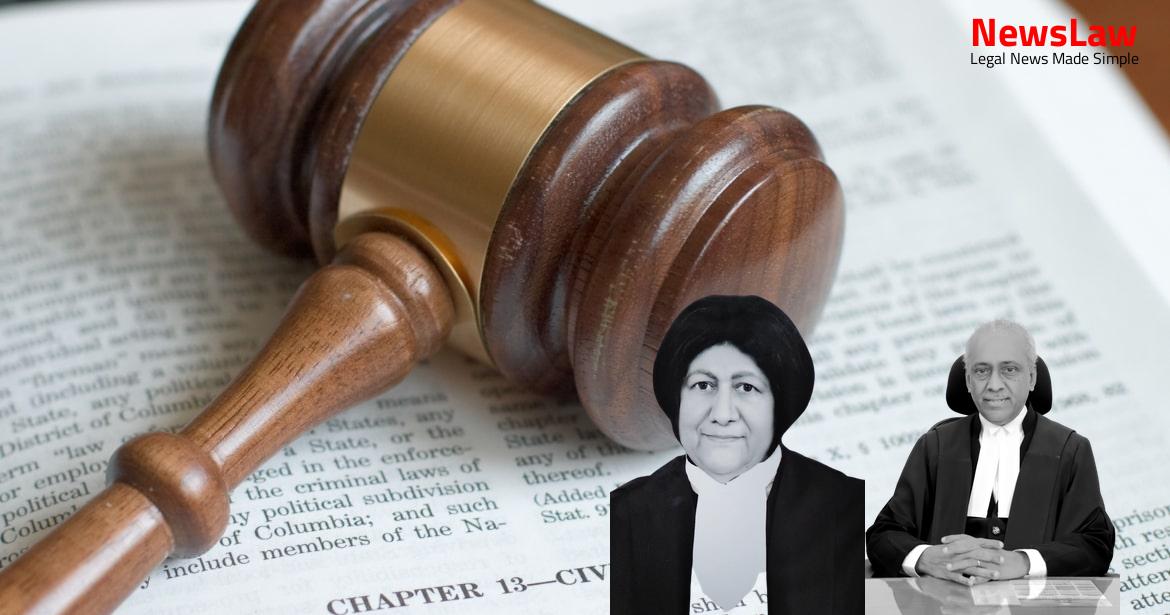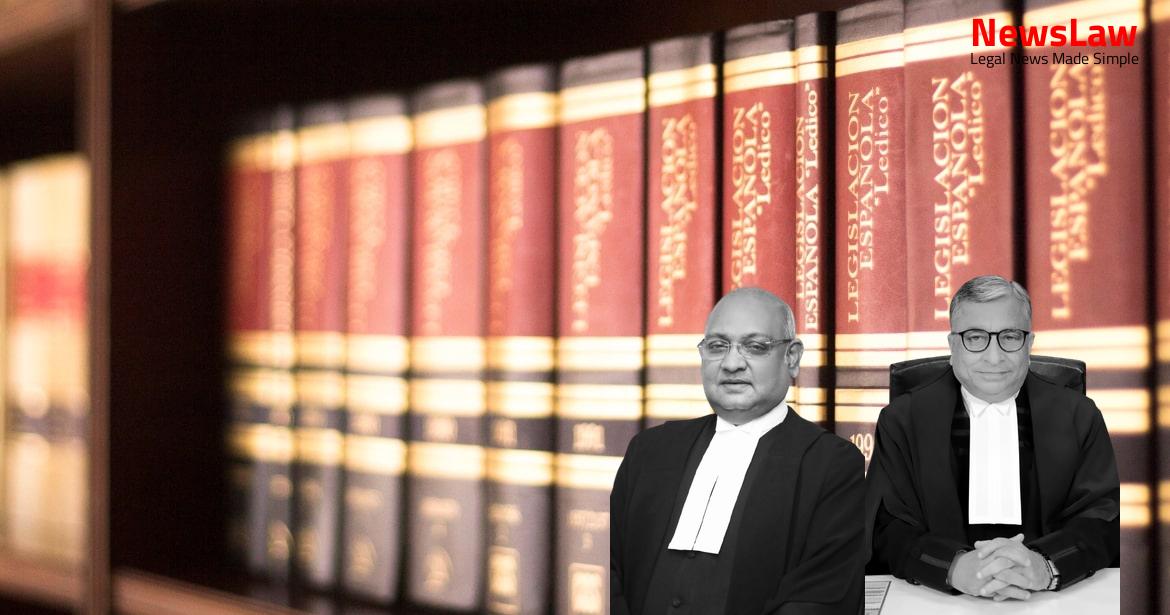In a significant legal development, the Supreme Court of India has pronounced its judgment in Criminal Appeal No. 1691 of 2023. The case involves a complex legal battle with implications for justice and accountability. This landmark judgment is set to have far-reaching consequences for the parties involved. Follow this summary for a detailed analysis of the court’s decision and the implications of the ruling. Stay updated on the latest legal proceedings in this high-stakes case.
Facts
- The conviction under Section 323 IPC resulted in both accused being sentenced to undergo RI for seven days.
- For the conviction under Section 324 IPC, the accused were sentenced to undergo RI for two years.
- The accused challenged the trial court’s judgment in the High Court in Criminal Appeal No 29/2007.
- The High Court altered the conviction of the accused under Section 304 Part-I IPC to Section 304 Part-II IPC.
- Accused No.1 was ordered to undergo the punishment of the sentence already served but fined amount not to be returned.
- Accused No.2 was sentenced to RI for five years without changing the fine imposed.
- All appeals and revision applications were heard together and disposed of by the High Court in 2016.
- The judgment and order dated 07.11.2006 resulted in the acquittal of accused Hussaini Mithiborewala and others in Sessions Case No.171 of 2004.
- Compensation of Rs. 90,000 was ordered to be paid to the legal representatives of the deceased Idrishbhai Fidaali Mithiborewala.
- The State filed Criminal Appeal No. 45 of 2007 seeking enhancement of the sentence imposed on the two accused in Sessions Case No. 292 of 2001.
- The High Court modified the sentence but upheld the conviction of the accused in Criminal Appeal No. 29 of 2007.
- All the accused in Sessions Case No. 171 of 2004 were acquitted by the trial court in 2006.
- The High Court disposed of all related criminal appeals and revision applications in 2016.
- The bail bonds of Hussainbhai Asgarali Lokhandwala stand cancelled, and he is directed to surrender to custody before 29 July, 2016.
- Failure to surrender will result in appropriate action being taken to secure his arrest.
- The sentence of Asgarali Onali Lokhandwala was modified to the period of incarceration already undergone, whereas Hussainbhai Asgarali Lokhandwala’s sentence was modified to five years.
- A Criminal Revision Application was filed by the injured witness, Husseni Mithiborewala, seeking conviction of the two accused under Section 302 IPC instead of Section 304 Part I IPC.
- Multiple Revision Applications were dismissed, and chargesheets were filed against the accused persons after investigation.
- Accused No. 1 pushed Arvaben, resulting in injuries, and refused to send his daughter with Abbasbhai.
- A cross FIR was lodged by accused No.1 against the husband and in-laws of Onejaben, leading to the arrest of both accused.
- Conviction of Asgarali Onali Lokhandwala and Hussainbhai Asgarali Lokhandwala was altered from Section 304 Part I IPC to Section 304 Part II IPC.
- There was a heated exchange between accused No.1 and Abbasbhai due to a matrimonial dispute involving the wife staying with her parents.
- The case was triable by the Court of Sessions, where it was registered as Sessions Case No. 292 of 2001.
- Prosecution examined 22 witnesses and various documentary evidence, followed by recording statements of the accused under Section 313 of CrPC.
- Accused No. 1 and No. 2 caused injuries to Idrishbhai Fidaali Mithiborewala, leading to hospitalization.
- FIRs were lodged, and a Criminal Revision Application regarding the quantum of sentence was registered.
- The sentence under Section 304 Part I IPC for the appellant-Hussainbhai Asgarali Lokhandwala was reduced to Section 304 Part II IPC.
Also Read: The Deceptive Promise: Supreme Court’s Verdict on Consent and Rape
Arguments
- Mr. Nikhil Goel, the counsel for the appellant, argues that the trial court’s conviction under Section 304 Part-I IPC was not justified.
- Counsel contends that the case should have resulted in acquittal.
- The High Court changed the conviction from Section 304 Part-I IPC to Section 304 Part-II IPC but erred in sentencing the appellant to RI for five years without justification.
- Counsel relies on evidence from multiple witnesses, particularly PW-3, claiming they were eyewitnesses but biased in favor of the deceased and others who were the aggressors.
- The appellant’s actions are argued to be in self-defense, with counsel citing a previous court decision.
- Three members of the appellant’s family were injured by the informant and his family.
- Lathi and knife were recovered from PW-3 and PW-5.
- Evidence from PW-16, PW-17, and PW-21 suggests that the informant and his family were the aggressors.
Also Read: Tax Collection Dispute: Mysore Sales vs. Excise Contractors
Analysis
- The trial court convicted Asgarali and Hussainbhai under Section 304 Part I IPC and under Sections 323 and 324 as well.
- The High Court altered the conviction to Section 304 Part II IPC for both Asgarali and Hussain.
- The incident involved a matrimonial dispute between Abbas and Oneja, leading to a tragic outcome.
- Hussain, in a state of emotional upset, stabbed Idrishbhai and PW-5 with a kitchen knife during the altercation.
- The alteration of the conviction is under contention, with one side arguing for a murder case under Section 302 IPC.
- Self-defense has been cited as a reason for the actions of the accused, Hussain, in specific for inflicting the fatal injuries.
- The state of Gujarat has not filed an appeal against the altered conviction and sentence of the accused involved.
- The possibility of interference with the altered conviction and the modified sentence imposed by the High Court is being discussed.
- The informant’s counsel is advocating for the murder case against both accused, emphasizing the severity of the crime.
- The sequence of events leading to the fatal stabbings, the disputes, and actions of the individuals are detailed in the analysis.
- The High Court judgment dated 06.05.2016 was concurred with in altering the conviction but modifying the sentence of the appellant.
- The incident was deemed to have occurred in the heat of the moment with uncontrollable anger by both parties.
- The charge was reduced from Section 304 Part I IPC to Section 304 II IPC by the High Court.
- In the interest of justice, the sentence of the appellant, Hussainbhai Asgarali Lokhandwala, was further modified to the period of incarceration already served.
- Other contentions raised at the Bar were deemed unnecessary to delve into given the altered charge and sentence.
Also Read: M/s Bhanu Iron and Steel Company Ltd. vs. Commissioner of Customs
Decision
- Criminal Appeal No 1691 of 2023 is partly allowed while all other criminal appeals are dismissed.
- Appellant Hussainbhai Asgarali Lokhandwala’s conviction under Section 304 Part II IPC is maintained but his sentence is modified to the period already undergone by him.
- The original complainant has the option to withdraw the fine, but if not withdrawn by 31 December, 2016, the entire amount will be utilized.
- Appellant Hussainbhai Asgarali Lokhandwala is directed to be released immediately unless detained in another case.
Case Title: HUSSAINBHAI ASGARALI LOKHANDWALA Vs. THE STATE OF GUJARAT (2024 INSC 609)
Case Number: Crl.A. No.-001691-001691 – 2023



